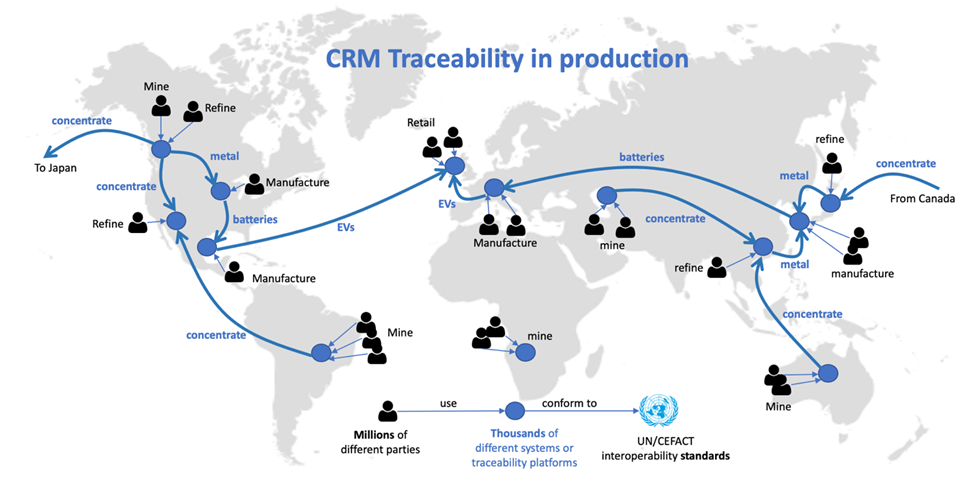Critical Minerals Traceability and Sustainability
other
Project Details
Project Purpose
In line with the UN sustainability goals and building on the success of the Textile & Leather traceability project, this project proposal seeks to develop a traceability and sustainability framework for critical raw materials (CRM1). This project supports the UN focus on extractive industries and builds on the UN/CEFACT role & capabilities to deliver digital standards for sustainable supply chains. The purpose of this project is to uplift verifiable critical raw materials supply chain resilience and sustainability through digital standards for data and trust. · Resilient supply chains are designed to avoid risky dependencies and can withstand disruptions. · Sustainable supply chains are designed to minimize environmental impacts and maximise human welfare. Both goals are met through traceability and transparency measures that this project will support through standardization. There are already many supply chain traceability platforms on the market. None will dominate the world’s supply chains and so must improve their interoperability so that supply chains can be traced across multiple independent platforms. This is the primary purpose of this project – namely to focus on the exchange of supply chain information between platforms. This project will
|
Project Scope
This project will deliver a suite of materials that support national policy makers, CRM industry actors, and traceability technology providers.
- A stakeholder mapping and engagement strategy to support a call for participation that will attract strong participation.
- A guidance document that provides an overview of business drivers, high level business requirements, and implementation guidance for a CRM traceability framework.
- A reference trust graph that models the supply chain participant roles, the credential types exchanged, and the role of governments as trust anchors.
- A harmonized sustainability vocabulary for CRM that builds on existing work from the International Trade Centre (https://standardsmap.org/en/identify) and other relevant work.
- A suite of standard credential schema to support each certificate type identified during the requirements gathering. These define the interoperability boundary between participating supply chain platforms.
- Analysis of mechanisms to link the physical goods to the digital twin via such methods as chemometric or radiographic markings – and subsequent recommendations to nations.
- A test suite that can be used by implementers to verify conformance with the credential standards.
Project Deliverables
The project deliverables are:
- Deliverable 1: Policy Recommendation
- Deliverable 2: Business Requirement Specification
- Deliverable 3: Guidelines
- Deliverable 4: Executive Guide
- Deliverable 5: JSON-LD vocabulary
- Deliverable 6: Credential Schema
- Deliverable 7: Other (specify) Test harness
Exit Criteria
The exit criteria will be
- Exit Criteria for Deliv. 1: Public Review logs demonstrating all comments have been satisfactorily resolved; Final document ready for publication.
- Exit Criteria for Deliv. 2: Public Review logs demonstrating all comments have been satisfactorily resolved; Final document ready for publication.
- Exit Criteria for Deliv. 3 and 4: Final document ready for publication
- Exit Criteria for Deliv. 5 and 6: Final deliverable ready for publication and for Bureau approval
Project Team Membership and Required Functional Expertise
Membership is open to UN/CEFACT experts with broad knowledge in the area of: Critical Raw Materials (CRM) supply chains. Digital trust and verifiable credentials. In addition, Heads of Delegations may invite technical experts from their constituency to participate in the work. Experts are expected to contribute to the work based solely on their expertise and to comply with the UN/CEFACT Code of Conduct and Ethics and the policy on Intellectual Property Rights.Geographical Focus
The geographical focus of the project is global.Initial Contributions
This project builds upon work already completed by UNECE and partner organisations.
- Rec 46 - https://unece.org/sites/default/files/2022-01/ECE-TRADE-463E.pdf
- T & L BRS - https://unece.org/sites/default/files/2021-03/BRS-Traceability-Transparency-TextileLeather-Part1-HLPDM_v1.pdf
- VC White paper - https://unece.org/sites/default/files/2022-09/WhitePaper_VerifiableCredentials-CBT.pdf
- Supply chain vocabulary - https://vocabulary.uncefact.org/
- GS1 CBV & EPCIS 2.0 - https://www.gs1.org/standards/epcis
- ITC Standards mapping - https://standardsmap.org/en/identify
Furthermore, there are a number of industry and national groups already working in the CRM space that may participate and contribute. This include but are not limited to :
- https://www.ameslab.gov/cmi The Critical Materials Institute is a U.S. DOE Energy Innovation Hub led by Ames National Laboratory that seeks to accelerate innovative scientific and technological solutions to develop resilient and secure supply chains for rare-earth metals and other materials critical to the success of clean energy technologies.
- https://www.global-reia.org The Rare Earth Industry Association (REIA) is a global organization with partners representing the whole REE value chain. It aims to develop a transparent, sustainable and integrated value chain for REEs.
- https://www.internationaltin.org/tin-supply/ supporting the tin industry and expanding tin use. A primary goal is to ensure an innovative, competitive, and sustainable supply chain and market for tin.
- https://www.cobaltinstitute.org This is a global industry association focused on promoting the sustainable and responsible use of cobalt, a critical mineral used in a variety of industries, including batteries, aerospace, and defense.
- https://www.gold.org This is an international association of gold mining companies focused on promoting responsible and sustainable mining practices and the use of gold in various industries, including electronics, jewelry, and investment.


